Official Transcript of the Keynote Address by Hazrat Mirza Masroor Ahmad (aba), Worldwide Head of the Ahmadiyya Muslim Community, Fifth Khalifah of the Promised Messiah (as), at the Inauguration of Bait ur Raheem Mosque, Cardiff, Wales
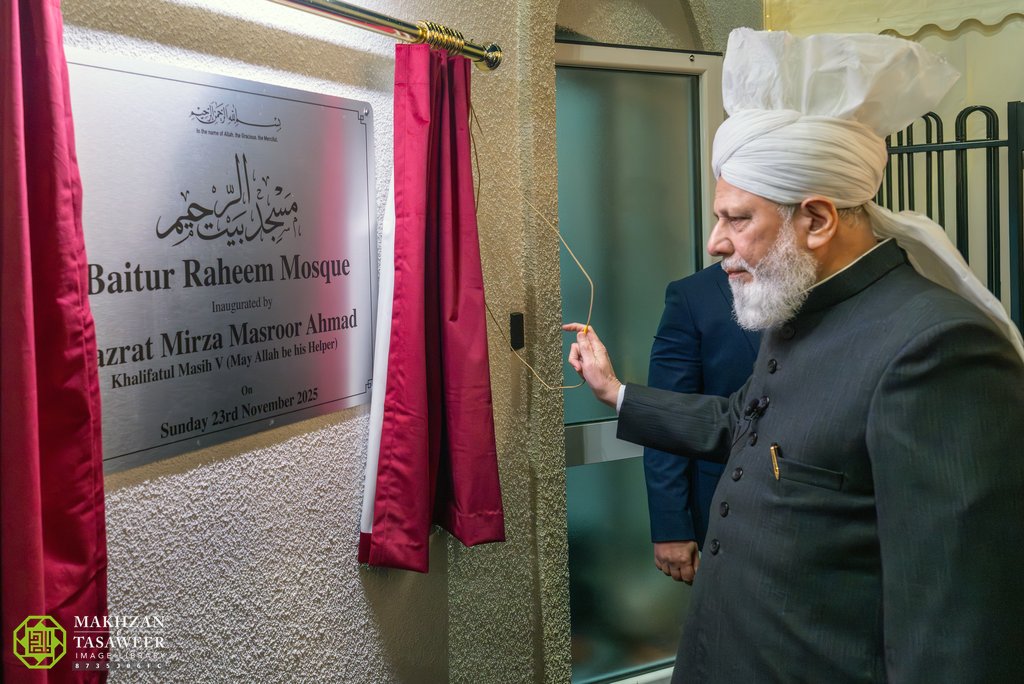
*Please note that this transcript may not be reproduced without express permission either on other websites or in print format.
After reciting Tashahhud, Ta`awwuz and Bismillah, His Holiness, Hazrat Mirza Masroor Ahmad, Worldwide Head of the Ahmadiyya Muslim Community, Fifth Khalifa, (aba) said:
‘All the distinguished guests, Assalamo Alaikum Wa Rahmatullahe Wa Barakatohu – peace and blessings of Allah be upon you all.
First of all, I would like to sincerely thank all of our respected guests for graciously accepting our invitation and joining us for the inauguration of this mosque. Your attendance at this purely religious and spiritual event demonstrates your open hearts and generosity of spirit.
The Purpose of Mosques
The purpose of this mosque, like all true mosques, is to serve as a sacred place where people gather to worship Allah. Moreover, wherever we build a mosque, it also stands as a testament to our commitment to our neighbours and the local community.
Indeed, the abiding message that echoes aloud from all our mosques is that where they serve as a place to worship Allah, they also serve to foster peace, compassion, and harmony throughout the world.
Thus, today, with the firm intention of fulfilling these noble objectives, the Ahmadiyya Muslim Community is overjoyed at being able to inaugurate our first purpose-built mosque in Wales. According to Islam’s teachings, when Ahmadi Muslims gather here to pray for themselves, they shall also pray for the peace, well-being, and security of all people.
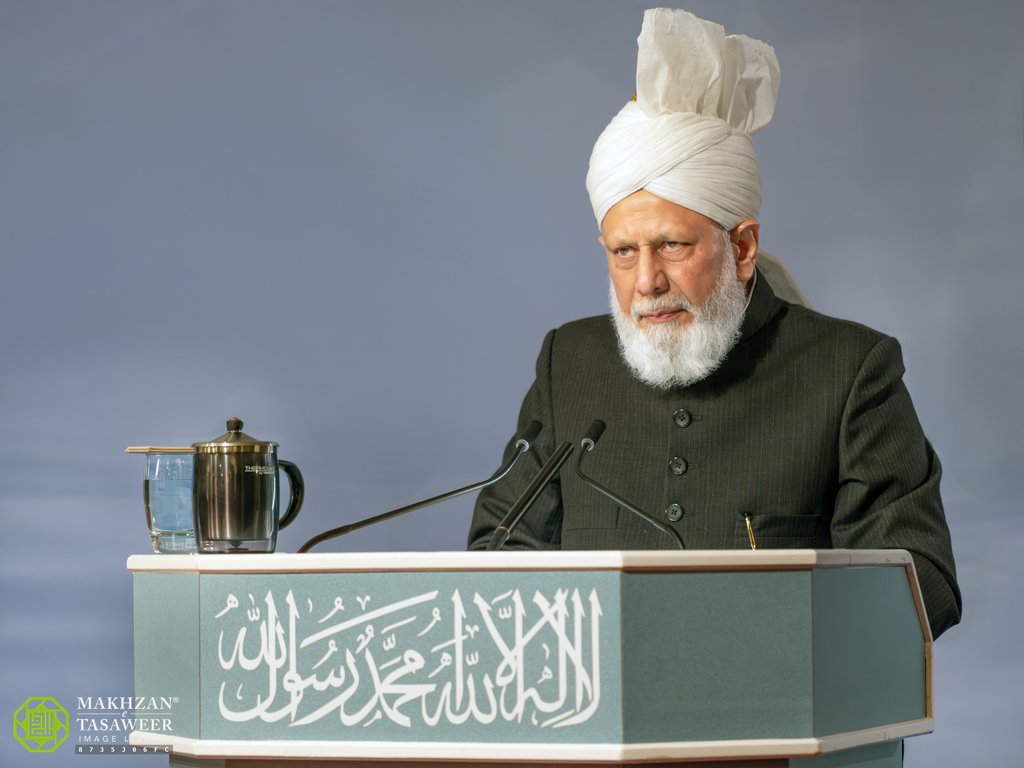
Given the misconception surrounding Islam, I understand that some people in the community may harbour reservations or have questions about the fact that a Muslim community has built a mosque here. Thus, at the outset, let me reassure you; our mosques are not built to sow discord, disorder, or to incite division; rather, they stand as shining beacons of peace, love, and harmony, and reflect the deeply rooted peaceful values of our faith.
Upholding the True Purpose of Mosques
Thus, during the time of the Holy Prophet, Muhammad (sa), a group of malicious people built a mosque with ill intent to create disorder and cause harm. Upon this, Allah the Almighty instructed the Prophet of Islam (sa) to demolish that so-called mosque.
So, the purpose of a mosque is not fulfilled by its physical construction; rather, a mosque only serves its purpose when it is used for both the worship of God and also to manifest Islam’s true teachings of kindness, love, and compassion for all mankind, and to spread peace and security throughout society.
Therefore, I reiterate that anyone who fears this mosque could harm the peace and well-being of society should rest assured; Islam’s teachings are so inherently peaceful that those who strive to follow them can never even contemplate any act of evil or inciting division.
Furthermore, based on our teachings, history, and practice, we affirm that the Ahmadiyya Muslim Community has always stood at the forefront of striving for peace in the world. Our history demonstrates that we have consistently upheld the rights of all people. It is irrespective of their faith or beliefs. This is not because we have deviated from Islam; rather, it is because we follow Islam.
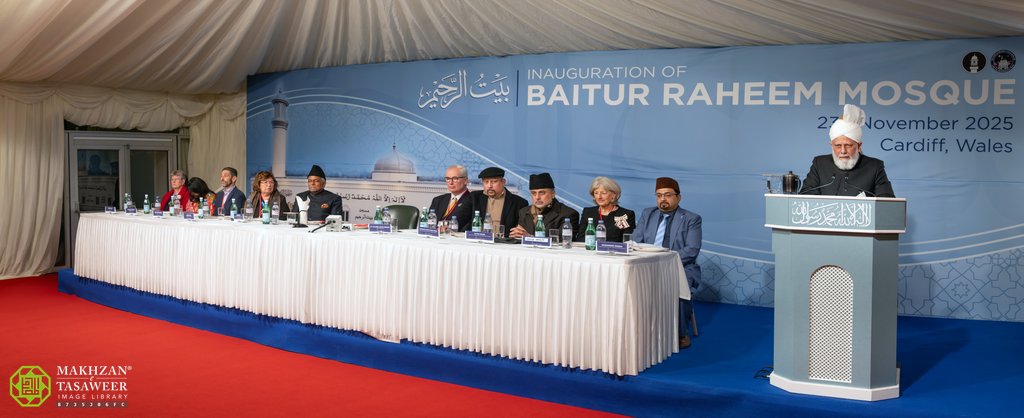
Worship Paired with Fulfilling the Rights of Others
Our religion teaches us that the worship and prayers of Muslims who disregard the rights of other people are worthless and displeasing to God. Indeed, in chapter 107, verse 5 of the Holy Qur’an, Allah says,
“So woe to those who pray.”
This verse warns that God rejects the prayers of certain people, and the surrounding verses shed light on this. In the preceding verses, Allah condemns those who ignore the rights of society’s most vulnerable members, such as orphans or those mired in poverty. The subsequent verse states that the prayers of such people are insincere, deficient, and performed merely to impress others. Their prayers manifest only their hypocrisy and deception, and so shall be rejected by God Almighty.
Similarly, in the final verse of the chapter, Allah describes those selfish people who categorically refuse to help people in desperate need. They not only fail to help but also prevent others from offering aid. Indeed, their hearts are so bitter and twisted that they cannot even tolerate offering temporary help. Thus, Allah the Almighty explicitly states that prayers and worship shall only be of value and accepted when aligned with service to humanity. This is a fundamental teaching of Islam.
The Qur’anic Guidance on Moral Choice
Likewise, in chapter 90, verse 11 of the Holy Qur’an, Allah the Almighty states,
“And We have pointed out to him the two highways of good and evil.”
In this verse, Allah declares that the Holy Qur’an has shone a light upon what is right and what is wrong, and clearly defined the parameters of truth and falsehood. Thus, if a person chooses the wrong path, the fault lies with him, for Allah has granted humans the ability to discern right from wrong. Just as we have physical eyes to see the world, He has also bestowed us with an inner spiritual eye, a moral compass to guide us. However, if a person ignores their internal compass and follows selfish and worldly desires, they are bound to deviate from the right path and embrace evil and wrongdoing.
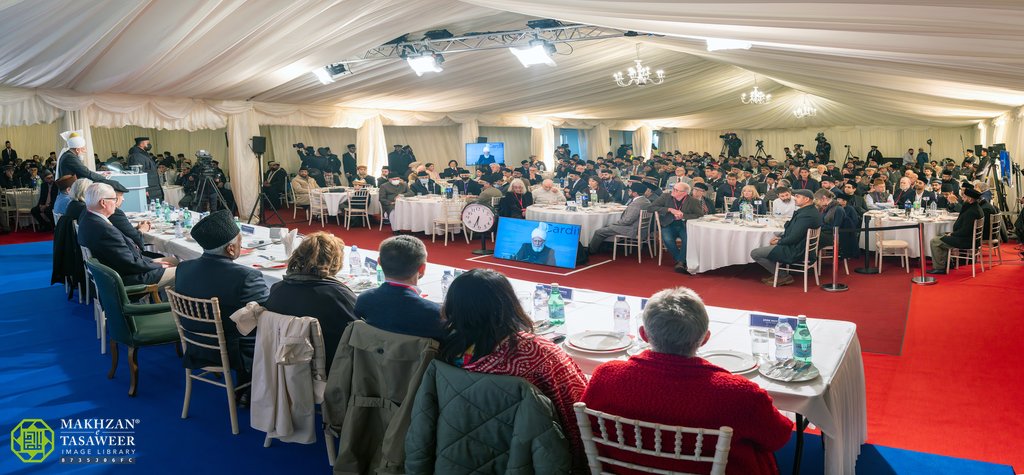
Eradicating Exploitation of the Vulnerable
As I said, the Qur’an has clearly laid out what is right and wrong. For example, in chapter 90, verse 14, Allah states that freeing an enslaved person is amongst the very highest forms of virtue. Whilst before Islam, slavery was a widespread custom amongst Arabs, the Holy Prophet Muhammad (sa) issued an explicit and revolutionary instruction that slaves ought to be freed. He personally led from the front by liberating all slaves who had come into his possession. Thus, Islam came to end all forms of slavery in the world.
You might wonder if the example of slavery is still relevant today. Regrettably, it is. While physical slavery has ended, another form of slavery – economic servitude – continues to oppress people in many parts of the world. Less developed nations are trapped by crippling debt, leaving them powerless to prevent the plundering and exploitation of their natural resources by rich and powerful countries. Ultimately, these vulnerable nations are dictated to by the wealthier nations.
Islam condemns such exploitation as a form of enslavement that must be eradicated because such inequalities and injustices inevitably shatter the foundations of global peace, something we increasingly witness today.
Social Welfare and Caring for the Vulnerable
The Qur’an’s emphasis on social care is further evident in subsequent verses of chapter 90. For instance, verse 15 states that feeding the hungry is a great virtue. Verse 16 establishes a duty to help and support orphans, and verse 17 commands Muslims to provide relief to the impoverished and weak.
The Qur’an specifically instructs Muslims to help a poor man lying in the dust. These words are deeply significant; meaning Muslims are obligated to help those who are utterly crestfallen, who have no one else to aid them, and who have been forgotten by society. While some people have family and friends to support them, Muslims are instructed to identify and to help those who have no one else. In economic terms, it means that if an individual has hit rock bottom and has no one to help them, a Muslim must endeavour to assist them and help them get back on their feet.
Imagine the impact if all the nations of the world, including every Muslim country, acted upon this unifying, magnanimous principle. Surely, it would be the means of tearing down the walls of crippling inequality, injustice, and ignorance that plague the world. And in their place, we would witness the majestic sight of rising tides of love, compassion, and understanding sweeping across society. True contentment, peace, and security would prevail.
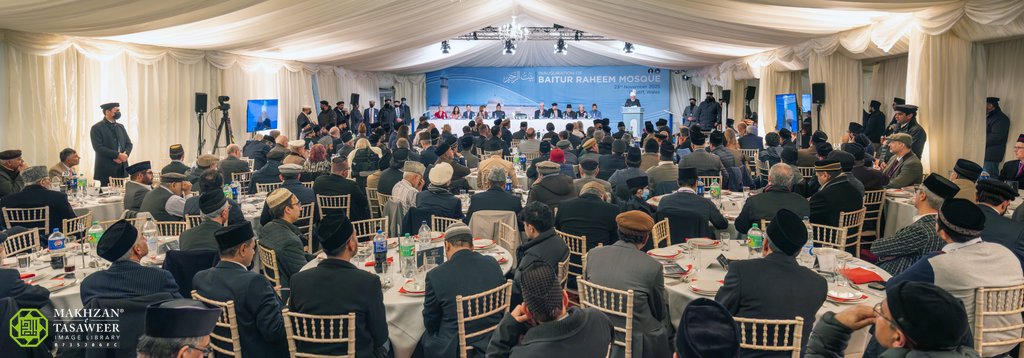
The Universal Applicability of Qur’anic Teachings
Certainly, we believe the values taught by the Holy Qur’an are universally applicable. Therefore, if any person, whether Muslim or not, acts upon them, the world will become more peaceful and harmonious. It is this mission of establishing peace and goodwill between all people which the Ahmadiyya Muslim Community strives to achieve. We invite all people, irrespective of their faith or beliefs, to join us in our effort to establish peace, tolerance, and mutual understanding among all people in the world. This is what the Qur’an teaches.
A Comprehensive Code of Moral Values
For example, chapter 4, verse 37 of the Holy Qur’an presents a comprehensive code of moral values and duties owed to others. It states,
“And worship Allah and associate naught with Him, and show kindness to parents and to kindred, and orphans, and the needy, and to the neighbour that is a kinsman, and the neighbour that is a stranger, and the companion by your side, and the wayfarer, and those whom your right hands possess. Surely, Allah loves not the proud and the boastful.”
Where, on the one hand, the verse commands Muslims to worship Allah the Almighty alone and not associate any partner with Him, it equally instructs them to show compassion and love to all mankind.
In terms of human rights, the verse firstly calls on Muslims to treat their parents with tenderness and affection. Neglecting one’s parents weakens the family unit whilst increasing the strain on the wider community. So, Allah says that caring for others should start from one’s home.
Then, Allah says Muslims must care for their relatives, friends, and fulfil their rights. The verse also instructs Muslims to be sympathetic to orphans and to all people who are underprivileged or vulnerable. It calls on Muslims to show love and consideration for their neighbours who they know, and to show respect and kindness to the neighbours who they do not know, or who live further afield. This includes even one’s work colleagues.
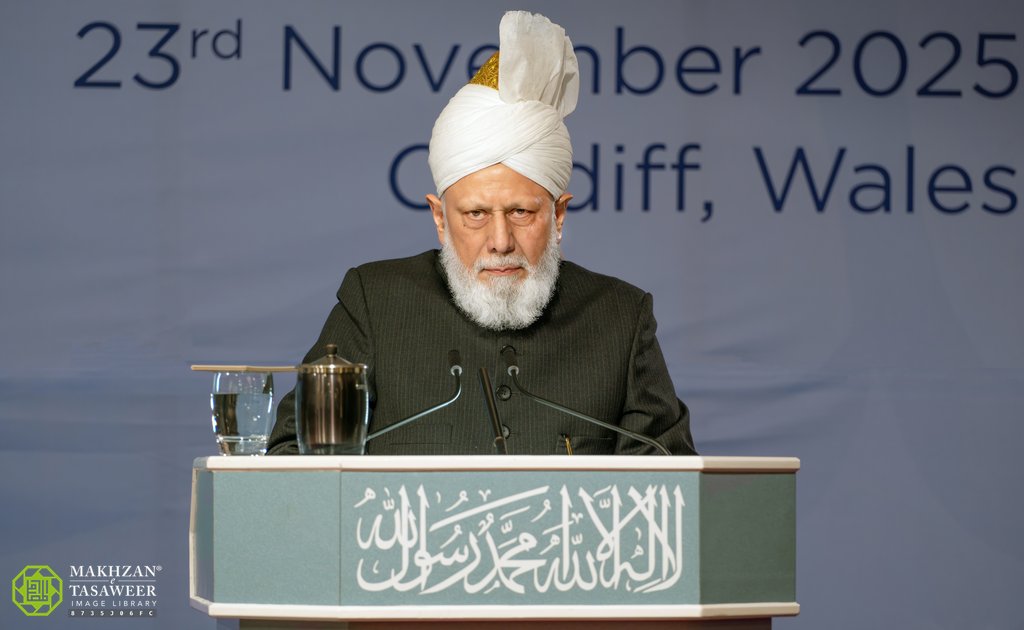
This verse further instructs Muslims to fulfil the rights of their travel companions. Islam teaches that when traveling, one should be benevolent and gracious to all people they encounter. For example, on public transport such as planes, trains, or buses, Muslims must show kindness to their fellow passengers. They must protect, respect, and show courtesy to them.
In the same verse, Allah says Muslims must care for subordinates or those under their duty of care. Those in a position of power should never wield their authority harshly or needlessly, as Allah dislikes arrogance or pride.
In the time available, I have mentioned just a few verses; but from cover to cover, the Holy Qur’an is filled with human principles, instructing Muslims to observe the highest morals, to be law-abiding, and to seek to serve the communities in which they live with sincerity and love.
Obedience to the Law and Loyalty to One’s Nation
For example, the Holy Qur’an instructs Muslims to respect their leaders and governments and to uphold the laws of the land. Muslims are taught that loyalty and obedience to their country are intrinsic elements of their faith. Consequently, those who possess even a basic attachment to Islam understand that pleasing God and fulfilling a mosque’s objectives are inseparable from adopting the highest moral values and serving humanity.
A Mosque’s Duty to Its Neighbours
As I said, the Holy Qur’an strongly emphasises the rights of one’s neighbours. Therefore, every Ahmadi who shall worship here is obliged to care for all of you and to manifest kindness and compassion. Similarly, they must show sympathy and extend support to all those who have struggles, including orphans, the hungry, or the infirm.
Moreover, all those who enter this mosque must be peaceful, law-abiding, and obedient to the authorities. I am sure you will agree that there is nothing to fear from people who uphold such values.
Humanitarian and Educational Projects of the Ahmadiyya Muslim Community
Let me also clarify that the Ahmadiyya Muslim Community does not just make claims or speak in a way designed to impress others; rather, we are determined to act on our teachings and to fulfil the demands of our faith.
In short, we practice what we preach. For example, we have established hospitals and medical camps for the treatment of the poor and vulnerable in the developing world that serve people without distinction of religion or belief. Those who do not believe in God or reject our values or beliefs are treated with the same care, love, and sympathy as our own people.
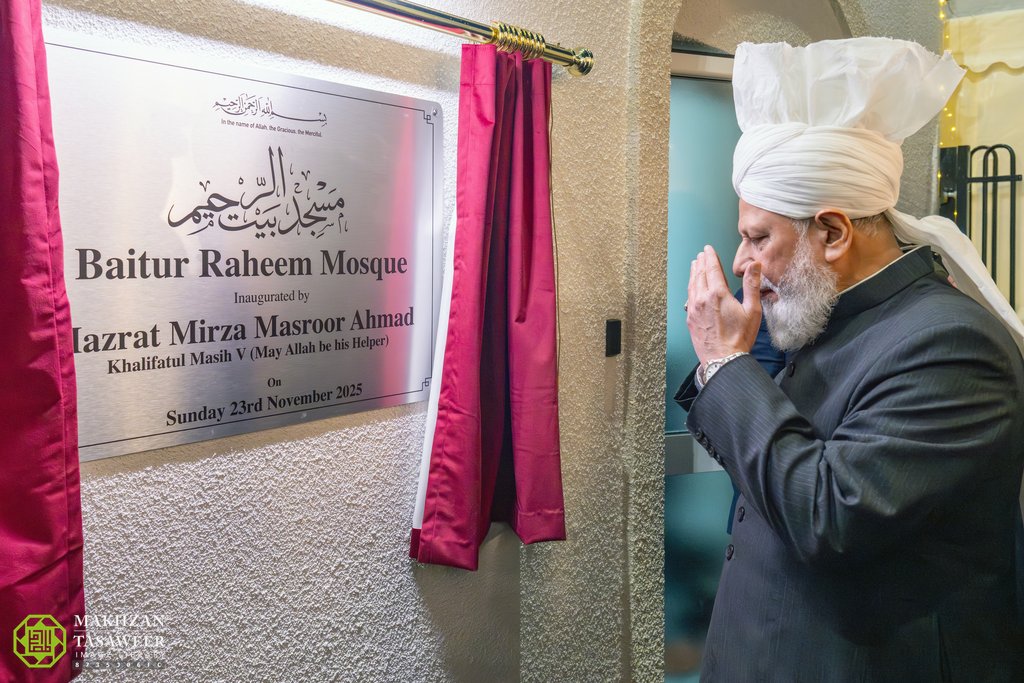
Similarly, we provide access to clean drinking water in remote parts of the world through the installation of water pumps and wells. Here in the Western world, people do not realise the true value of water and are unable to appreciate how difficult it is for some people in deprived countries to access it. Instead of going to school, many children frequently walk miles to fetch water for their families on a daily basis. This gravely impacts their future and means that without help, the cycle of poverty in which they were born is bound to continue. Accordingly, we identify areas of urgent need and send our engineers and experts to provide them with access to water in their homes or at their doorsteps.
These life-changing humanitarian projects are taking place in Africa, Asia, South America, and other underdeveloped regions. We have also established orphanages providing shelter, love, and care to some of the world’s most vulnerable children.
In terms of education, we have established hundreds of schools across the developing nations that provide primary and secondary education without any distinction. It matters not whether the students in our classrooms are Christians, Jews, Muslims, atheists, or follow any other belief. Every child is of immeasurable worth and value.
So, with the grace of Allah, the Ahmadiyya Muslim Community is constantly engaged in serving humanity, and this includes supporting local charities and community projects across the United Kingdom. Our sole aspiration and motivation is to alleviate suffering and to enable people to live their lives with dignity.
A Mosque as a Beacon of Light and Peace
Thus, I am confident you will see for yourselves that this mosque will prove itself a true beacon of light. It shall shine forth not just for those who worship here, but it will project a message of peace and security for all people, irrespective of their faith or beliefs. Above all, it shall symbolise that serving Allah and serving humanity go hand in hand.
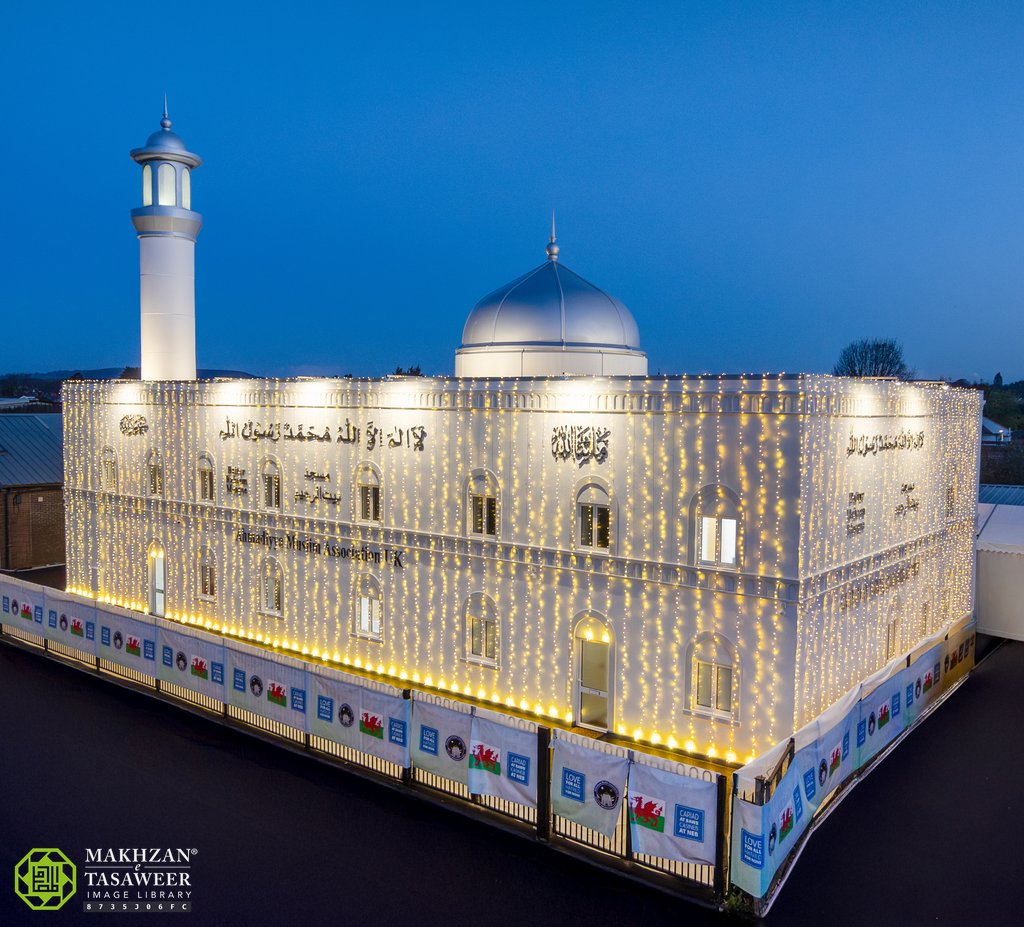
A Reminder for Local Ahmadi Muslims
Now, before concluding, I also wish to remind all Ahmadi Muslims living in this area that they must strive to live according to the inclusive and noble teachings of Islam that I have outlined today. While it is their duty to worship Allah in this mosque and pray for peace, it is equally their obligation to strive towards achieving it and to be ready to make sacrifices for the greater good of mankind.
They must consider how they can play a practical role in bringing peace to the world and demonstrate to others that the only way to establish a society free from disorder and division is by living together with the spirit of peace, love, respect, and unity. Thus, now that this mosque is open, it is my heartfelt prayer that those who enter it will not only fulfil the requirements of worshipping Allah, but also always fulfil the needs of humanity.
A Closing Note of Thanks and Prayers
With these words, I wish to once again sincerely thank you all for joining us this evening. May Allah bless you all with peace and happiness. Ameen. Thank you very much.’



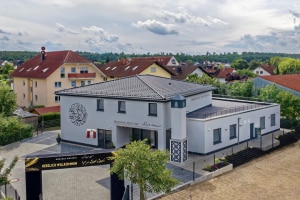
Add Comment